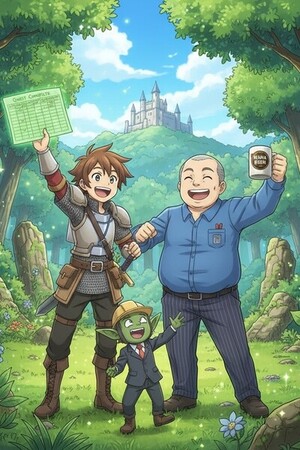Chapter 32:
The Choice
Earthly Solutions
The portal appeared on a Tuesday morning while Mr. Tanaka was in the middle of conducting the most comprehensive financial audit in the history of the kingdom, and its timing could not have been more inconvenient.
"Yamamoto," Mr. Tanaka called out from across the Royal Treasury chamber, where he was surrounded by what appeared to be several decades' worth of previously misfiled tax documents, "could you come look at this calculation? I think I've found a systematic accounting error that's been compounding for..."
His sentence was interrupted by the familiar sound of reality tearing apart. The same crackling energy, the same impossible light, the same feeling of dimensional boundaries being casually violated that had characterized our original transportation to this world.
"Oh, come on," I said, staring at the growing rift in the air above a pile of royal expense reports. "Really? Now?"
The portal was smaller than the one that had originally transported us—perhaps six feet across instead of the massive tear that had consumed our entire office building. But it was definitely the same phenomenon: a shimmering gateway between dimensions that radiated the kind of cosmic energy that made filing cabinets vibrate and caused loose papers to swirl around the room.
"Is that what I think it is?" Mr. Tanaka asked, abandoning his audit calculations to stare at the interdimensional rift with obvious dismay.
"It's a portal back to our original world," I confirmed, recognizing the specific quality of light that had characterized our departure from Earth. "A way home."
"But I'm in the middle of implementing systematic reforms to the entire kingdom's financial infrastructure!" Mr. Tanaka protested, gesturing toward the comprehensive organizational project that surrounded us. "I can't leave now—I'm only eighteen months into a twenty-four-month optimization timeline!"
I watched him frantically gather his audit materials, apparently trying to organize his work so that someone else could potentially continue the project in his absence.
"Plus," he continued, "the Q4 closing procedures are scheduled for next month, and I haven't finished training the staff on the new documentation requirements. And the Royal Treasury still needs systematic implementation of the depreciation accounting standards I developed. And—"
"Mr. Tanaka," I interrupted gently, "the portal might not stay open indefinitely. If we're going to have a choice about returning to our original world, we probably need to make that choice fairly quickly."
He stopped organizing papers and looked at me with the expression of someone who had just realized that all his carefully planned timelines might be about to become irrelevant.
"Do we want to go back?" he asked.
It was a question I'd been avoiding thinking about for months. When we'd first arrived in this world, returning home had seemed like the obvious goal. But now, after everything we'd accomplished and built, the prospect of abandoning our new life was genuinely complicated.
"I don't know," I admitted. "What would we be returning to?"
"Our old corporate jobs, assuming they still exist," Mr. Tanaka said, consulting his mental inventory of what we'd left behind. "Quarterly compliance reviews, meaningless bureaucratic procedures, managers who don't understand what we do or why it matters."
"Plus," I added, "no clients who appreciate our work, no community that depends on our services, and no opportunity to implement the kind of systematic improvements we've been developing here."
We stood there in the Royal Treasury chamber, surrounded by evidence of meaningful work and systematic accomplishment, while a portal to our previous life of corporate mediocrity hung in the air above us.
"On the other hand," I said, "reliable electricity, easily accessible coffee, and bathroom facilities that don't require strategic planning."
"And legal systems that actually protect individual rights, economic frameworks that reward competence, and regulatory oversight that isn't designed primarily to enable corruption," Mr. Tanaka added.
"Plus internet access and the definitive absence of Giant Toads in the plumbing system."
"Those are significant quality-of-life considerations," he agreed.
The portal was beginning to pulse with increasing intensity, suggesting that our decision window might be limited.
"Mr. Tanaka," I said, "what do you want to do?"
He looked around the treasury chamber, with its systematic organization projects and evidence of comprehensive reform, then at his briefcase full of optimization procedures and institutional improvement plans.
"Yamamoto," he said slowly, "for the first time in my adult life, I'm doing work that actually matters. Work that helps people. Work that uses my skills to solve real problems that make a genuine difference in the world."
"And?"
"And I'm not ready to give that up to return to pushing papers for a corporation that considers us disposable."
I realized that I felt the same way. Despite the challenges and conflicts we'd faced, our life in this world had provided something our Earth career never had: the satisfaction of meaningful work that was genuinely appreciated.
"But," Mr. Tanaka continued, "you should make your own decision. Your situation is different from mine."
"How so?"
"You have Selena. A relationship, a partnership, a personal connection that could provide fulfillment regardless of professional circumstances." He paused. "I have my work. If you have both work and personal fulfillment here, your choice might be different."
I thought about Selena, about our relationship and our collaboration, about the life we'd been building together.
"I need to talk to her," I realized. "This decision affects both of us."
"Of course. Take whatever time you need." He returned to organizing his materials. "I'll be here, trying to figure out how to document handover procedures for systematic reform projects in case one or both of us decides to leave."
As I hurried toward Selena's smithy, leaving Mr. Tanaka alone with the portal and his comprehensive organizational challenges, I realized that our interdimensional adventure had created exactly the kind of problem I'd never expected: having to choose between a comfortable life in our original world and a meaningful life in a world that had become home.
That was a much better problem to have than the ones we'd started with.




Please sign in to leave a comment.